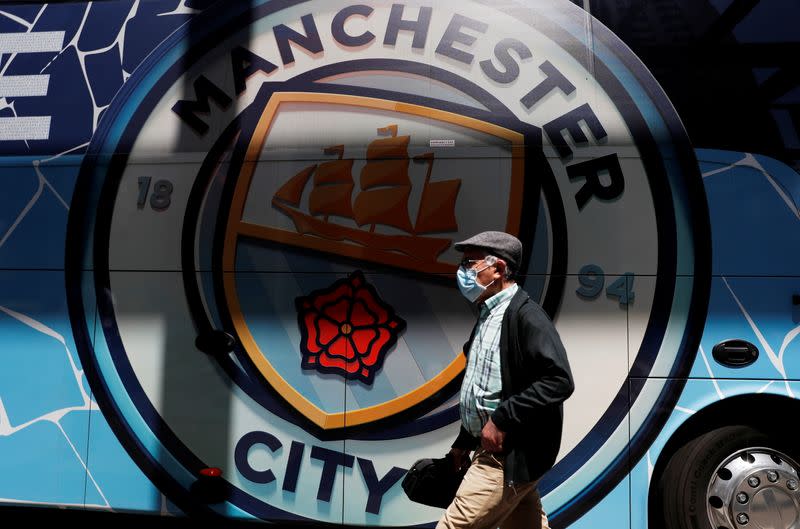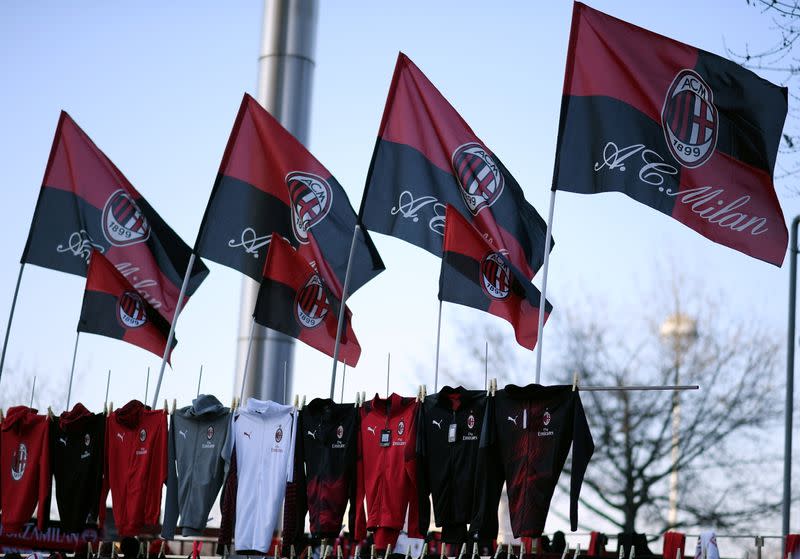Soccer clubs embrace cryptocurrency, but fans are divided
By Tom Wilson and Anna Irrera
LONDON (Reuters) - A growing number of major soccer clubs are launching digital coins that allow fans to vote on a variety of minor decisions as the sport faces slumping revenues caused by the coronavirus pandemic.
But supporters are divided over the so-called fan tokens. Some appreciate the novel way to engage with their teams - and help make decisions, even if only on small-time matters such as the song played at matches after a goal is scored or images used on social media. Others dismiss the tokens as superficial participation that adds to the already growing costs of following their teams.
Among the clubs to launch tokens in recent months are English Premier League champions Manchester City and Italy’s AC Milan. Spain’s national team - which drew its first match of the European Championship tournament on Monday - says it plans to launch a similar scheme. Argentina, which kicked off its Copa America campaign on the same day with a draw, launched its tokens last week.
Fan tokens can be traded on exchanges like other cryptocurrencies, and have also attracted the attention of retail traders and professional investors. And prices are prone to wild swings and can have little connection to on-field performance. Some of the big-name clubs’ tokens have lost about two-thirds or more of their value over recent weeks, mirroring similar declines in the broader cryptocurrency sector.
Malcolm Clarke, chair of the Football Supporters' Association, which represents fans in England and Wales, said the clubs are either trying to make money from allowing fans a say in how clubs are run or “they’re trying to squeeze extra money out of supporters by making up inconsequential 'engagement' online polls,” he said. “Neither is a good look.”
Fan tokens have gained appeal for clubs amid the pandemic revenue squeeze, as games have been played with no fans in attendance, executives from three mid-sized European clubs said. Sales at Europe’s top 20 revenue-generating clubs dropped 12% to 8.2 billion euros ($9.9 billion) in the 2020 fiscal year, which for most clubs was the 12 months ending in June, according to accounting and consulting firm Deloitte LLP.
Those executives and others from larger clubs said the tokens have helped boost engagement with fans who are often spread across the world. Some tokens also provide access to promotions and competitions.
Soccer teams typically team up with a crypto technology firm that issues the tokens and get a share of revenue from their initial sale. Prices vary but at least several big-name clubs initially launched their tokens at about $2 each; prices have later fluctuated.
Manchester City and the soccer associations of Spain and Argentina did not respond to requests for comment. A spokesperson for AC Milan said embracing fan tokens was a strategic move to enhance its digital presence and “stay closer” to its over 500 million fans around the globe.
Having a way to engage with fans during lockdown “was beneficial for clubs and fans,” said Giorgio Ricci, chief revenue officer at Italy’s Juventus, which launched its tokens prior to the pandemic.
Katia Gigliotti, a fan of Italy’s AS Roma, said she initially was hesitant about paying for the tokens but has appreciated the engagement with the team and other fans during lockdown.
“Not being able to go to matches was traumatic because for me soccer means stadiums,” said the 48-year old electrical engineer, who regularly traveled for hours to watch matches.
GRAPHIC - Fan tokens: A volatile bet https://graphics.reuters.com/CRYPTO-CURRENCY/FANTOKENS/jbyprgbkave/chart.png
EMBRACING CRYPTO
The rise of fan tokens is part of a deepening embrace by the sports industry of cryptocurrency. In some sports, teams have offered to pay players and staff in digital currencies while others accept cryptocurrencies for tickets or merchandise. Fans and investors can buy and trade non-fungible tokens (NFTs) in the form of officially licensed videos of game highlights from a National Basketball Association-branded website.
Soccer clubs have taken the lead in offering fan tokens. A number of well-known European clubs have partnered with Chiliz, a unit of Malta-based Mediarex Enterprises Ltd. Spain’s national team and Scotland’s Rangers have partnered with a Turkish blockchain platform. Germany’s Borussia Dortmund is working with two other startups.
Chiliz Chief Executive Alexandre Dreyfus, a former online betting executive, said the company pays a fee to the club and shares revenue from the initial sale of tokens. Chiliz said it is targeting $200 million of sales this year; about half of its sales are then shared with the its partner clubs.
Dreyfus said Chiliz gives some tokens to “hardcore” fans, such as season ticket holders, “so there is no extra cost for ‘following their teams.’”
Chiliz has launched 20 fan tokens with soccer teams. It also has launched eight tokens with teams from other sports, including motor racing and mixed martial arts.
The total market value of the 21 publicly-traded tokens issued by Chiliz was around $260 million as of June 13, up two-thirds from the end of 2020 but down by half from its May peak, according to blockchain researcher Christian Ott, who runs the Fantokenstats website. Those tokens are mostly connected to soccer but also include teams from some other more niche sports.
Chiliz did not respond to a request for comment on the volatility of the tokens or possible risks to investors.
FANS DIVIDED
Some fans object to the idea of being asked to pay for involvement with their teams. “Why should you have to pay to have any sort of say in the club?” said Sue Watson, chair of West Ham United Independent Supporters’ Association. She said it adds to existing costs of following a team, such as buying season tickets and soccer strips. “It mounts up, it’s not cheap.”
West Ham’s plans to launch a token with Chiliz last year didn’t go ahead, according to the technology company. West Ham didn’t respond to requests for comment.
Borussia Dortmund has faced opposition to the tokens from supporters. The club told Reuters it was modifying its plans for a token that had been due to launch in March, without providing further details.
Still, some soccer fans like the tokens because they enjoy feeling more involved. “It’s nice that the song you voted for is the one you hear, and you think ‘I participated in that’,” said Giuseppe Bognanni, a 39-year old retail manager and fan of Juventus.
($1 = 0.8248 euros)
(Reporting by Tom Wilson and Anna Irrera; Editing by Rachel Armstrong and Cassell Bryan-Low)




